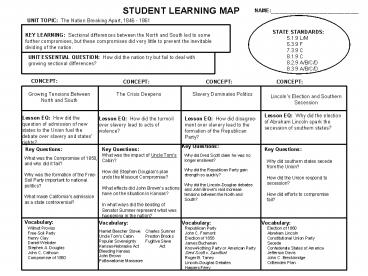UNIT TOPIC: The Nation Breaking Apart, 1846 1861 - PowerPoint PPT Presentation
1 / 1
Title:
UNIT TOPIC: The Nation Breaking Apart, 1846 1861
Description:
secession of southern states? 5.1.9 L/M. 5.3.9 F. 7.3.9 C. 8.1.9 C ... Why did southern states secede. from the Union? How did the Union respond to. secession? ... – PowerPoint PPT presentation
Number of Views:47
Avg rating:3.0/5.0
Title: UNIT TOPIC: The Nation Breaking Apart, 1846 1861
1
STUDENT LEARNING MAP
NAME_______________________________
UNIT TOPIC The Nation Breaking Apart, 1846 -
1861
STATE STANDARDS
KEY LEARNING Sectional differences between the
North and South led to some further compromises,
but these compromises did very little to prevent
the inevitable dividing of the nation.
5.1.9 L/M 5.3.9 F 7.3.9 C 8.1.9 C 8.2.9
A/B/C/D 8.3.9 A/B/C/D
UNIT ESSENTIAL QUESTION How did the nation try
but fail to deal with growing sectional
differences?
CONCEPT
CONCEPT
CONCEPT
CONCEPT
Growing Tensions Between North and South
The Crisis Deepens
Slavery Dominates Politics
Lincolns Election and Southern Secession
Lesson EQ Why did the election of Abraham
Lincoln spark the secession of southern states?
Lesson EQ How did the question of admission of
new states to the Union fuel the debate over
slavery and states rights?
Lesson EQ How did the turmoil over slavery lead
to acts of violence?
Lesson EQ How did disagree- ment over slavery
lead to the formation of the Republican Party?
Key Questions
Key Questions
Key Questions
Key Questions
What was the impact of Uncle Toms Cabin? How
did Stephen Douglass plan undo the Missouri
Compromise? What effects did John Browns
actions have on the situation in Kansas? In what
ways did the beating of Senator Sumner represent
what was happening in the nation?
Why did Dred Scott claim he was no longer
enslaved? Why did the Republican Party
gain strength so quickly? Why did the
Lincoln-Douglas debates and John Browns raid
increase tensions between the North and South?
What was the Compromise of 1850, and why did it
fail? Why was the formation of the Free- Soil
Party important to national politics? What made
Californias admission as a state controversial?
Why did southern states secede from the
Union? How did the Union respond to
secession? How did efforts to compromise fail?
Vocabulary
Vocabulary
Vocabulary
Vocabulary
Wilmot Proviso Free-Soil Party Henry Clay Daniel
Webster Stephen A. Douglas John C.
Calhoun Compromise of 1850
Republican Party John C. Fremont Election of
1856 James Buchanan Know-Nothing Party or
American Party Dred Scott v. Sandford Roger B.
Taney Lincoln-Douglas Debates Harpers Ferry
Election of 1860 Abraham Lincoln Constitutional
Union Party Secede Confederate States of
America Jefferson Davis John C.
Breckinridge Crittenden Plan
Harriet Beecher Stowe Uncle Toms Cabin Popular
Sovereignty Kansas-Nebraska Act Bleeding
Kansas John Brown Pottawatomie Massacre
Charles Sumner Preston Brooks Fugitive Slave
Act































